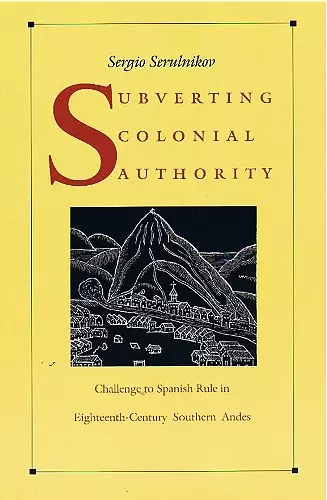Subverting Colonial Authority
Challenges to Spanish Rule in Eighteenth-Century Southern Andes
Format:Hardback
Publisher:Duke University Press
Published:23rd Sep '03
Currently unavailable, and unfortunately no date known when it will be back

A political history, giving the first systematic examination of how and why localized forms of indigenous community protest against Spanish rule in the Andean region produced a new ethnic consciousness and violent uprisings.
Focuses on a center of rebel activity during the age of the Tupac Amaru revolution: the Northern Potosi region of Bolivia. This book explores the forms of colonial domination and peasant politics in the area from the 1740s through the 1780s. It addresses issues such as indigenous rebellion, European colonialism, and Andean cultural history.This innovative political history provides a new perspective on the enduring question of the origins and nature of the Indian revolts against the Spanish that exploded in the southern Andean highlands in the 1780s. Subverting Colonial Authority focuses on one of the main—but least studied—centers of rebel activity during the age of the Túpac Amaru revolution: the overwhelmingly indigenous Northern Potosí region of present-day Bolivia. Tracing how routine political conflict developed into large-scale violent upheaval, Sergio Serulnikov explores the changing forms of colonial domination and peasant politics in the area from the 1740s (the starting point of large political and economic transformations) through the early 1780s, when a massive insurrection of the highland communities shook the foundations of Spanish rule.
Drawing on court records, government papers, personal letters, census documents, and other testimonies from Bolivian and Argentine archives, Subverting Colonial Authority addresses issues that illuminate key aspects of indigenous rebellion, European colonialism, and Andean cultural history. Serulnikov analyzes long-term patterns of social conflict rooted in local political cultures and regionally based power relations. He examines the day-to-day operations of the colonial system of justice within the rural villages as well as the sharp ideological and political strife among colonial ruling groups. Highlighting the emergence of radical modes of anticolonial thought and ethnic cooperation, he argues that Andean peasants were able to overcome entrenched tendencies toward internal dissension and fragmentation in the very process of marshaling both law and force to assert their rights and hold colonial authorities accountable. Along the way, Serulnikov shows, they not only widened the scope of their collective identities but also contradicted colonial ideas of indigenous societies as either secluded cultures or pliant objects of European rule.
“Subverting Colonial Authority is a major contribution to the ongoing revision of the history of colonial Latin America and of the development of the modern world in general. It should be read by scholars not only of Latin America but also of world and even European history.”—Karen Spalding, author of Huarochirí: An Andean Society under Inca and Spanish Rule
"Sergio Serulnikov analyzes the root causes, key moments, and bloody consequences of the massive indigenous revolt that nearly toppled Spanish rule in the southern Andes in the early 1780s. Exhaustively researched and cogently argued, this is a major work on the connection between everyday resistance to colonialism and revolutionary upheaval to end it forever. Essential reading for students and scholars of colonial rule everywhere."—John H. Coatsworth, Harvard University
ISBN: 9780822331100
Dimensions: unknown
Weight: 549g
304 pages